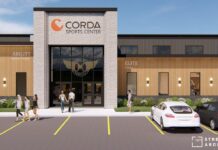McGrath Automotive Group’s Pat McGrath speaks with Nate Kaeding during a podcast recording session at the CBJ’s office in North Liberty.
Sponsored by West Bank, this is the latest edition of the CBJ’s new podcast feature with Nate Kaeding and notable Iowa business and cultural leaders, available first to CBJ members. Listen to the pilot with editor Adam Moore here or on Spotify, and watch past editions of Real Success on the CBJ’s YouTube channel.
By Nate Kaeding
[email protected]
Often times in business, planning for future success means budgeting for the year ahead, hiring and retaining key people and forming a sound strategic plan. But for a “legacy” family business, like the McGrath Family of Dealerships, success is more about building a strong company that can be passed down to generations to come.
That’s no easy task, as McGrath Automotive President Pat McGrath will tell you. The McGrath family has beat the odds, with a third generation now entering the business his father started in Eau Claire, Wisconsin in 1952. It’s an impressive history, and a mark that only about 12 percent of family-owned businesses reach, according to the National Bureau of Economic Research. It’s also a responsibility that Mr. McGrath takes seriously.
“You know, I’m just a holder of the shares, I’m not really an owner of them,” he told me when we sat down in mid-December to record a new podcast. “My dad had them, my brother had them. I’ve got some, Mike’s got some. Now our kids are getting them, and I’m just here to pass them on.”
Mr. McGrath spoke with me about his family’s work building the family’s sprawling collection of dealerships around Eastern Iowa, what he learned from his battle with cancer, his all-time favorite car and leadership lessons from Deepak Chopra.
NK: You were born into an automobile family — your dad, H.B., started up in Wisconsin with a Buick dealership before moving down to Cedar Rapids. What are some of your earliest memories growing up around the auto industry?
PM: Well, when I was 11, my dad would bring me down when they were closed. He was working all the time, and he’d say, “Alright, go empty those garbage cans, mop that floor” and then I’d play around in the cars or go into the service department. … So I was around it all my life, and I went to work early — heck, I was driving by 13, cars around the lot.
My brother Bruce was there [working at the dealership] at the time, which was kind of cool. He’s almost 20 years older than me, and I got to see him a lot. I started working there as a kid and got to know him through that, basically. And it was a lot of fun being downtown Cedar Rapids.
What was the dealership like?
It had a streetfront showroom, a dungeon of a service department — it had like three layers, and guys always playing jokes and jacking around, which was a lot of fun back then.
Were there any other professional interests for you back then? Or was it always a given that you would come into the family business?
You know, I’d work there, but then what I ended up doing in the summer was construction and then the railroad — I got on the Milwaukee [Railroad] for two summers, which is a great job. It’s tough, but it was great money. So I worked construction two summers, the railroad for two summers and then another construction job. But then I went to UNI and moved into an apartment between my junior-senior year. And right by my apartment was John Deery Motors. So I went over and said, “Hey, I need a job just as I go to school.” So I went into the detail department, and John [Deery] and I kid, because I was like, “Man, you’re two years older me, I’m in the detail department working, and you’re the dealer coming back and telling me to get to work.” But that was a good time, too.
When you were up at UNI, did you know that when you were done there, you were going to go back and work in the family business?
I actually told my dad when I got back … I took a few months off and said “I’m going to move to Minneapolis.” And I went up and interviewed for a job up there at a Pontiac store where my brother knew the guy. At that time, my dad was 70 and my mom was 70, and he’d never … he didn’t talk much, hardly gave advice or anything. He was just like, “Hey, I’d like you to consider staying in town for your mother.” Because they were at an age, you know. So I went out and interviewed with my brother’s general manager, and went selling cars.
What were some of the early lessons you learned from selling cars?
Probably just relationship building. It was all about that, because then people called or walked in. There was no internet or anything like that, so the relationship was face-to-face. You know, that’s how I met my wife.
Really?
I sold her a car.
You must have given her a pretty sweet deal then.
Yeah, exactly. She said she paid 12 grand to find a husband. [Laughs] One of my best buddies, I sold him a car in Iowa City. So relationship building was a big part of it.
Did you have a favorite car back then?
Yeah, and I’ve got it now. A 1972 Chevy K5 Blazer — the big ones, two door. In fact, my wife surprised me about eight years ago with one at Christmas. It was our shop vehicle when I worked for my dad, and I used to use it during the summer as kind of the party wagon. So I got one, and they’re awesome.
Do you remember the first car you actually sold?
It was a Grand Prix, to a young gal. I can’t remember her name, but she was excited — of course, I was excited, too. I can still picture it, which is wild.
So you’re working for your brother, Bruce, in Cedar Rapids. What would you describe as your big break?
Well, when it turned was … my brother was great, because he had his son, Mike, in the business with us, too. He looked at the two of us and said, “This store is not big enough for three families.” And I said, “If you invest with me, I’ll go anywhere if I can be my own deal.” That was in ‘87. So I bought a dealership in Iowa City, an Oldsmobile-GMC-Isuzu store from the McEleney-Hargrave family. We bought that, moved to Iowa City and loved it.
Probably another big turning point was in 1990. The Chevy store in Cedar Rapids came up for sale, and it had been owned by the same family since 1926 — the Fletcher family. Bruce and Mike [McGrath] had the Pontiac store, and we merged and bought [the Chevy dealership] and formed McGrath Automotive Group. So I ran that in Iowa City, Mike ran the Pontiac store, and Bruce stepped back quite a bit at that point. He was the smart one, he retired around 52.
And then from there everything really blossomed.
Yes, but it didn’t blossom for quite a while. We bought the dealership in 1991, and it wasn’t until around 2007 that we started growing. A lot of our growth has been in the last six, seven years.
What would you say is the main catalyst for that growth?
A couple of things. One big one was I got diagnosed with a pretty significant cancer diagnosis — stage four. It made me reflect and go, “Wow.”
What year was this?
That was December of ‘07. It made me look at the business. … At that time, it was pretty obvious my kids and Mike’s kids were going to get in the business. Gavin [McGrath] was going into his final year of college. Lindsay was out of college working for me. Jamie expressed interest, Murphy, Griffin, they’d all expressed interest. So I’m going, “Wow, we’ve got two stores …” Because I’d sold Iowa City.
The two stores were just getting into the motorcycle business, but I’ve got three kids, Mike’s got three kids — we weren’t big enough. It made me really reflect on what kind of company I had built. It wasn’t substantial enough to call a family business. So I went through ’08, which was a wild year — a lot of treatment, that kind of stuff — and that’s when I went, “We gotta grow this deal.” We have some capable kids that want to be in this business — they’re smart, they’re going to work hard, and we have to have an opportunity for them. So that’s when the growth mindset really came into play.
And that was born from your battle with cancer?
It was, absolutely. I had a lot of blinders on before that — just put my head down, let’s go to work. All of a sudden it made me sit back and go, “Wait a minute. What’s the future look like for this company?” I want to build a legacy company.
You know, I’m just a holder of the shares, I’m not really an owner of them. My dad had them, my brother had them. I’ve got some, Mike’s got some. Now our kids are getting them, and I’m just here to pass them on.
How are you doing today with your battle with cancer?
It’s great. It came back in ‘09, but I’m in great shape, and I beat it. I would never, ever wish it upon anybody, but I’ll tell you, it’s probably one of the best things that ever happened in my life. It changed the way I saw business, the way I saw family. But it’s not the way to learn that.
What’s the recipe for creating a business that lives beyond just you?
Well, first of all — and this is to me, secondary — but you’ve got to be profitable so you can have the capital, right? I mean, you’re just not going to be able to do it without that. But number one is the people. We’ve got a great group, and our purpose is to be the company of choice. We truly believe that. We want to know that if somebody says, “You know, I’d love to be in that business,” they’ll talk to the McGraths. And that is the legacy that we’ve got to build, because I can’t — Gavin can’t, Lindsay, Murphy, Mike, we can’t do it on our own. We have got to have great people doing their roles that really get it, buy into our whole mission statement and make a difference.
Did you appreciate the importance of team members early on in your career?
That is a great question — no, I did not. I was a doer and a taskmaster, and intended to, just push, push, push. Hours are hours and that’s just the way it is. And probably my biggest lesson learned was to delegate and empower people. Because I didn’t do much of that for a while. I didn’t empower — I just told them, “Do this, do that, do this. This is how we’re doing it.” I think once I figured that out and started empowering our people and letting them make mistakes, that really turned the corner for us.
I’ve always been curious about how leaders and executives like yourself go about that sort of personal and professional development. Did you have outside people that you worked with, who helped you develop that leadership skill set?
Absolutely. In our industry, we have what they call “20 Groups.” We’re in five or six of them now, but that’s 20 dealers. And those have been a huge resource — there’s guys I still call and ask, “Hey, what are you doing about email? Do you run into this?”
I also meet quarterly with some business leaders in other industries. Jeff Disterhoft [president and CEO, UICCU], him and I meet quarterly. I was on his board for seven years. And, I have to tell you, he is, without question, probably the best business leader I know in the Corridor. I want to learn from that guy. And so we meet, we trade books, take notes, have a beer, and we bounce stuff off each other. Duane Smith [CEO, TrueNorth Companies] is another great leader. I’ve learned a ton from him.
Also, just on personal development, I’ve been going to Kellogg over at Northwestern for executive education. Deepak Chopra taught a class on leadership, which I was like, “Wow, this guy’s gonna teach a class on leadership.” It was fascinating to me — just a total different perspective of what’s a leader. … In fact, life leadership was a lot of it.
As you look back on your career, what would you hope people would say if asked, “What are the hallmark traits of Pat McGrath?” How do you want to be remembered?
I guess number one, that he was a really good guy. Hopefully there’ll be a handful of people, maybe more, who would come forward and say, “You know, he really changed my life. He really had a very positive effect on me, and I exceeded any expectation of myself.”
RAPID FIRE QUESTIONS
If given the chance, what other profession would you have most liked to attempt?
Offensive line coach for football.
Favorite business leader?
Here locally, Jeff Disterhoft. And Bill Belichick. Some people don’t like the guy. I admire him, and I really liked the way he has built what he’s done.
Preferred daily news sources?
Apple News, I’m on it at least a couple times a day. And then the Harvard Business Review.
How about a podcast or TV show?
“The Andy Griffith Show” has always been a favorite, and college football.
How about a motivational quote?
I’ve got a pillow that sits on my bed that I got around ‘07. It says, “It’s not the mountain we conquer but ourselves,” by Sir Edmund Hillary.
If you had 30 extra minutes each day?
I would meditate. I used to do it and love it. It got me through some tough times.
Most influential business book?
My Bible as I grew up through the business was “Managing” by Harold Geneen.
In just one sentence, how would you define success?
Demand a lot of yourself, and in turn your people will demand a lot out of themselves. I truly believe the speed of the leader, the speed of the team. And our people truly live by that.




